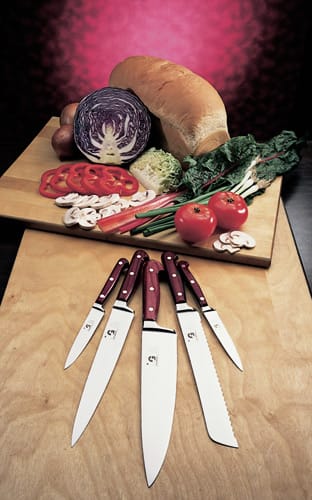When you visit the Town of Pictou, Nova Scotia, you may be a little surprised to see a huge knife sticking through the corner of a building on Water Street. Go inside for a factory tour and you'll discover a unique Nova Scotian product, prized for its quality and its craftsmanship. Grohmann Knives is a Nova Scotia success story, one that begins long ago and far away, in pre-war Czechoslovakia.
Rudolph Grohmann was production manager in a knife factory in Sudetenland. "Each year a buyer from Quebec would come to buy knives and he would encourage my dad to come to Canada to open a knife factory," says his daughter, Berta Babinec.

"My dad turned him down because we had a good life there. However, after the war, in 1945, the Sudeten Germans were driven out of Czechoslovakia. My father and our family were not driven out because he was needed for the knife factory but the Czechs had stripped us of nearly everything. So the next time Mr. Reich came, my father accepted his offer on the condition that he could bring his whole family. On Feb. 9, 1949, we left everything behind. My mother, my father, my sister and I and our families came to Canada. We came to Pictou, NS, because, except for shipbuilding, there was hardly any industry there at that time."
The Nova Scotia government paid their passage but the family had to repay it. Pictou Cutlery was started in the building which today houses the School of Fisheries and Aquaculture. Rudolph was in charge of production and his family members were employees.
"My father was 54 years old when we came to Canada to start a new life. It was pretty hard," Berta says. "We didn't speak English, just spoke with our hands."

Pictou Cutlery made only kitchen knives and there was tough competition in that line. By 1952, the board of directors had decided to shut the company down. For the next few years, the Grohmanns worked at other jobs in the area. But Rudolph did not give up his dream of making knives. He built a little shed behind his house and started making folding pocket knives. He engraved scenery on the blade and used a deer antler for the handle. Berta was the seller. "My nephew, Michael Sachs, and I went every Saturday selling those knives door to door. We picked out the bigger houses where we thought they had more money. We went all the way to Truro and Halifax."
By this time Berta had picked up quite a lot of English. One day she read an article about Deane H. Russell, a man who had a knife shop in Ottawa, and had designed a new Canadian knife for sportsmen. He needed someone to make the Russell Belt Knife. Berta wrote to Mr. Russell. Within a few days, he was in Pictou at the Grohmann door with a big bag of sketches. "You are my dream come true," Berta remembers him saying to her father as he introduced himself.
The knives quickly won acceptance and accolades. Three other models were designed. In 1961 Rudolph Grohmann formally formed Grohmann Knives Ltd. to produce Russell Belt Knives.
Berta remembers, "We had to make a dozen a week, then two dozen. My father asked my husband, Michael, to help him make knives. My mother and I cleaned them, packed them and sent them out. We got $2.50 a knife back then. We were so happy."
In 1969, Berta and Michael Babinec bought the business. Today Michael and Berta work at the factory from time to time while their sons Michael, Roland and Norman run the day to day business. Grohmann now produces about 12 different styles of outdoor knives, 10 different styles of kitchen knives and has six different lines to choose from. It also makes custom knives. The story of how the knives are made is fascinating-the 53 steps that go into the process, the unusual materials used, but you'll have to take a tour or visit the Web site www.grohmannknives.com to get that.
